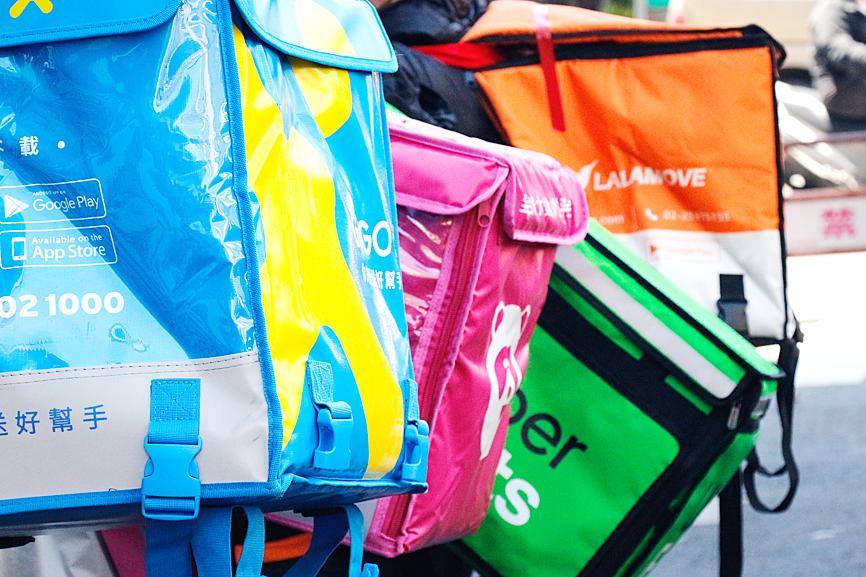People working with Taiwan’s major food delivery platforms on Tuesday pledged to form a union to demand fair pay and called for legislative action.
At a news conference outside the Ministry of Labor building in Taipei, organizers called on people who work with Foodpanda Taiwan Co (富胖達) and Uber Eats Taiwan to sign up for the proposed National Delivery Industrial Union.
The main purpose of the union is to increase delivery drivers’ leverage in negotiating for fair pay rules with the two platforms, said Su Po-hao (蘇柏豪), the group’s spokesman.

Photo: CNA
Last month, Foodpanda introduced new pay rules, citing better compensation for drivers who dispatch orders with pickups far from their destinations the main reason, said Chen Yu-an (陳昱安), another group member.
A few weeks later, Uber Eats did the same, saying that the new rules would encourage drivers to take orders during peak times, Chen said.
However, service fees were reduced, Su said.
Drivers for Foodpanda in Taichung, as well as Changhua and Nantou counties, faced a pay decrease of 10 to 30 percent last month, while Uber Eats deliverers in Taipei, New Taipei City and Keelung saw similar drops, he said.
Drivers usually have no idea how the platforms gauge their service fees, Chen said.
After updating the rules this month, Uber Eats no longer reveals the makeup of a driver’s service fee for each order, he said.
The union would also seek to lobby the ministry and lawmakers to propose legislation for food deliveries and protect drivers’ rights, they said.
The number of food deliverers in Taiwan had increased to 88,000 as of the end of last year, ministry data showed.

South Korea’s equity benchmark yesterday crossed a new milestone just a month after surpassing the once-unthinkable 5,000 mark as surging global memory demand powers the country’s biggest chipmakers. The KOSPI advanced as much as 2.6 percent to a record 6,123, with Samsung Electronics Co and SK Hynix Inc each gaining more than 2 percent. With the benchmark now up 45 percent this year, South Korea’s stock market capitalization has also moved past France’s, following last month’s overtaking of Germany’s. Long overlooked by foreign funds, despite being undervalued, South Korean stocks have now emerged as clear winners in the global market. The so-called “artificial intelligence

NEW IDENTITY: Known for its software, India has expanded into hardware, with its semiconductor industry growing from US$38bn in 2023 to US$45bn to US$50bn India on Saturday inaugurated its first semiconductor assembly and test facility, a milestone in the government’s push to reduce dependence on foreign chipmakers and stake a claim in a sector dominated by China. Indian Prime Minister Narendra Modi opened US firm Micron Technology Inc’s semiconductor assembly, test and packaging unit in his home state of Gujarat, hailing the “dawn of a new era” for India’s technology ambitions. “When young Indians look back in the future, they will see this decade as the turning point in our tech future,” Modi told the event, which was broadcast on his YouTube channel. The plant would convert

‘SEISMIC SHIFT’: The researcher forecast there would be about 1.1 billion mobile shipments this year, down from 1.26 billion the prior year and erasing years of gains The global smartphone market is expected to contract 12.9 percent this year due to the unprecedented memorychip shortage, marking “a crisis like no other,” researcher International Data Corp (IDC) said. The new forecast, a dramatic revision down from earlier estimates, gives the latest accounting of the ongoing memory crunch that is affecting every corner of the electronics industry. The demand for advanced memory to power artificial intelligence (AI) tasks has drained global supply until well into next year and jeopardizes the business model of many smartphone makers. IDC forecast about 1.1 billion mobile shipments this year, down from 1.26 billion the prior

People stand in a Pokemon store in Tokyo on Thursday. One of the world highest-grossing franchises is celebrated its 30th anniversary yesterday.